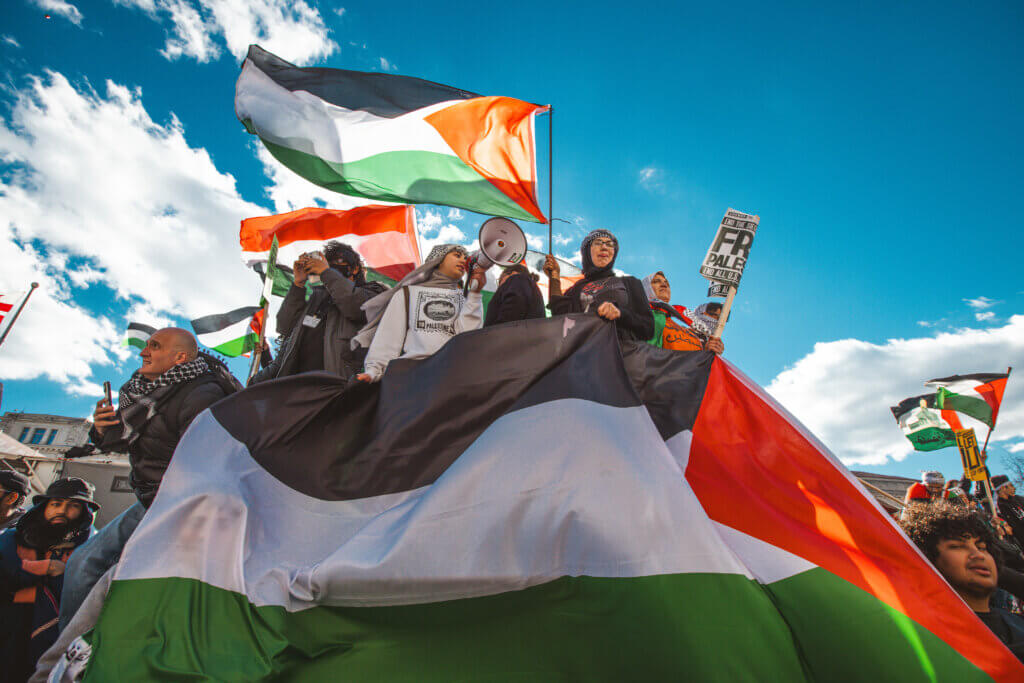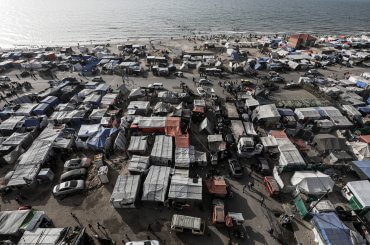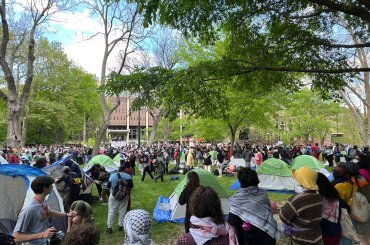They apprehended him at the airport, and that, my friend told me, was the “silver lining.” He knew they were coming for him, but he was terrified they would break in and snatch him from his bedroom, which is more traumatizing than being arrested during the routine, albeit humiliating, questioning one has come to expect upon landing in Tel Aviv.
Omar will be behind bars, in administrative detention, for the next four months. Technically, I should write “for the next four months at least” because the incarceration order is indefinitely renewable, but I cannot bear thinking of that heartbreaking possibility, let alone what they might have done to him, or are doing.
“There is nothing that we can do,” other friends said when I suggested we campaign for his release. When one becomes an administrative detainee—kept hostage without charge or trial—no amount of public pressure can influence the military commander to rescind his decision. “Not even The Hague.”
Besides, he would have despised the optics of posters, protests, and social media posts dedicated solely to him, as he hates the inevitable individuality of such campaigns. Though, in terms of the qualifications necessary to seduce a Western audience into solidarity, he possessed them all: the ‘unique story,’ the ‘respectable resume,’ the ‘saintly character.’
But hundreds in Zionist dungeons face the same unknown fate. Tens of thousands whose lives—not only freedom—were decimated, pulverized in the last few months. Most of them nameless, most of them unsung. Singular stories, especially when told recklessly, tend to isolate the individual from the group, sanctifying the former and demonizing the latter. Singular stories tend to situate man-made atrocities outside of politics, reinventing them as inexplicable natural disasters.
Omar was imprisoned precisely because he refused such singularity.
Since his charges remain undisclosed, per the protocols of the prison, I can speculate that it was his resolute presence on the streets, during protests and jail support, that put him in the enemy’s field of vision.
When Ramallah slept—or was drugged, or anesthetized into political paralysis—he was among the few hundred who were awake in the dormant city, chanting, shouting, and sending desperate smoke signals, telling Gaza, “You are not alone.” Our land’s mutilated geography could not separate him (and those with him, those he was with) from the rest of our people, his eyes were watching over Gaza, only pausing to glare at those looking away.
He would have refused to distract from those surviving on animal feed or stitching their loved ones’ limbs onto their stolen bodies; his arrest is only a symptom of a much more menacing condition. That too was a silver lining. Believing this, digesting this moral and political clarity is easier on the stomach than conceding to one’s own powerlessness or, worse, one’s own sordid spinelessness.
It was years ago on the streets of Ramallah, when the city was alert and flouncing, that I made a morbid joke. Nizar Banat, a dissident, political leader of some sorts, had just been killed by a special force of the Palestinian Authority (the latter obtained Israeli permission to cross from “Area A” in Ramallah to “Area C” in Hebron, where Banat resided, to murder him) and thousands were protesting.
“Raise, raise, raise your voice,” we were chanting, “those who chant do not die!” “Ironically,” I turned to my friend, “he died because he chanted.” I don’t know what to do with brutality except to laugh at it. My friend was not amused.
Nizar died because he was alone, she scolded me.
(It was, in a way, a vulgar allusion to Amal Dunqul’s line, “I hang from the morning’s gallows / and my forehead is lowered by death / because alive, I did not lower it.” Dunqul seemed to believe that the hangman would only spare those burrowing their heads in the sand.)
“They can’t kill us all,” she said. If everyone—lawyers, doctors, grocers, business owners, professors, custodians, car dealers, dope dealers—were chanting, the argument goes, nothing could kill us, not the American-made tear gas thrown at us by PA security forces, nor the bullets, also American, fired at us by soldiers donning the Star of David on their fatigues.
Whether that is true—that ‘the people united will never be defeated’—is yet to be seen. What is true, unnervingly, undoubtedly, is that our conundrum is not about victory or defeat, rather, it is about the simple fact that there is no excuse for us to hide in our safe silences while our siblings are slaughtered.
How bitter, how shameful is survival if won only in solitude?
Are we indeed all Palestinians, in our thousands and millions, as we chant on the streets of New York and London?
I have been asking myself that question, incessantly, obsessively. Two years ago I would have said, declared even, that the cement of the Israeli military barriers is just that—cement—and the only weight it holds is symbolic. Their colonial borders, try as they might, do not and could not sever the social and national ties keeping our isolated towns together. Our different papers—travel documents, passports, laissez-passers, or lack thereof—are mere words on a page, incapable of dividing us.
Those confined by siege or incarceration, I would have said, can still be emancipated in the mind, those dispersed behind walls and barbed wire can still unite in their hearts.
And yet I am on the streets of New York and London, protesting—there is repression, though no tear gas yet—and Omar is in a cell in one of the Occupation’s prisons (in which at least 35 Palestinian political prisoners have been martyred since October 7). In Gaza, men in tracksuits are shot in the chest, in the head, in the courage of their last action, be it running towards an armored Merkava or running away to relative safety.
In Beirut’s Shatila refugee camp, a grandfather lives and dies haunted by visions of his old house by the beach, so visceral he could almost smell it. In Jerusalem, I worry about my family’s house, about my brother on his commute to work, the trigger-happy police.
Other cities might as well be other planets, each with their own leading cause of death: snipers here, warplanes there, expulsions, exile, erasure, genocide, infanticide, humiliation, heartache, bureaucracy, imprisonment, intracommunal violence, theft, thirst, famine, poverty, isolation, defeatism, blackmail, you name it.
Fragmentation is not merely symbolic, it has transformed us into a million people living in a million states at once. One segment of our society, what remains of it anyway, has paid a steeper, bloodier price than the rest in recent years—a detail one cannot simply gloss over.
Once upon a time, I could easily estrange myself from the classes that I have long despised and envied (the elites, the bourgeoises, and those for whom Palestine is an aesthetic metaphor), but a new class has emerged in the narrow inferno of the Gaza Strip: the starved and the repeatedly, relentlessly, implacably dispossessed, and it is impossible to be more than an impotent spectator, impossible to belong to that class, not without bruises, not without sacrifice.
It is tempting, almost comforting—particularly as I look at the food on my table and the roof over my head—to indulge in guilt, but it is an unproductive sentiment, it does not start revolutions. Guilt imposes itself like a nagging cavity, you are acutely aware of its presence, but you continue to shovel the same sweets in your mouth, until your teeth rot, until you self-destruct.
These days I am haunted by a subtler, though deadlier, refrain, an unwanted realization: Gaza has the right to forsake us, to never forgive us, to spit in our faces. How many wars has it confronted? How many martyrs has it given? How many bodies were stolen from it, snatched from their fathers’ embrace? And how many of us stutter when asked about resistance, or disavow our right to resist entirely, our need to resist? How many of us choose our careers over our kin? How many of us could have done something, anything, but did not?
Since October 7, many public figures, many of them Palestinian, especially in the West, have reconsidered—even renounced—the catharsis they felt upon viewing the images of “Palestinian bulldozers” demolishing parts of the Israeli fence encircling Gaza. Many have regretted celebrating the paragliders escaping their concentration camp. (I put “Palestinian bulldozers” in quotes because it is an unbelievable phrase.)
“It had not [yet] become apparent that hundreds had been deliberately shot and kidnapped,” one artist wrote. It is hard to believe that anyone thought that the spectacular imagery of October 7 (capturing military tanks then dancing atop them) had happened without bloodshed. You begin to wonder whether those latent apologies were calculated business moves.
The Western world, with its prominent cultural and academic institutions, rejected Gaza’s upheaval against the siege, and it demanded that our intelligentsia act accordingly. We were commanded to uphold the status quo (a status quo many of us have built our careers critiquing discursively) in order to maintain our positions, our access, our reputations as the “good ones.”
Submission to the colonial logic that vilifies the violence of the oppressed and turns a blind eye to the oppressor’s violence became the price of admission. Some paid it without hesitation, others struggled as they did it.
Or this phenomenon is a lot more innocent than cunning careerism; perhaps we are simply afraid. Fear is all around us. It has infested newsrooms and campuses and invaded our apartments and places of worship. It has turned thunderous declarations into anonymous whispers. Those of us who stand with ‘the children of darkness’ will be blackmailed and blacklisted. ‘Either you are with us or with the terrorists,’ bosses and world leaders say to those who listen, planting fear in their hearts.
Do those anxieties constitute a real psychological condition, or are they the aftermath of a successful fear-mongering policy meant to stifle the masses? What is that fear, anyway, compared to the fear of dying of starvation, of being flattened under a military tank, of being suffocated under the rubble, of being the lone survivor of your family, of your heart breaking for the millionth time?
What is that fear if not theater?
I, too, am afraid. When I heard the news about Omar, many told me I should not go back home or else I would also be in handcuffs. But even from my glass house, I can say with certainty there is no room for fear or silence. Not when we have seen stray cats eat our people, not when we have seen Zionism scorch their flesh—our people’s flesh—time and again with inexorable, arrogant impunity.
It is almost as if the world is telling us a morbid joke: we will kill you if you resist and kill you if you hide, and if you refuse, and if you concede, and we will devour your land and gulp your oceans and kill you with hunger and thirst.
The massacres will be televised, broadcast in broad daylight. Our judges will legalize them. Our politicians, inert, inept, or complicit, will fund them then feign sympathy, if any. Our academics will stand idle—that is, until the dust settles, then they will write books about what should have been. Their rotten institutions will commemorate us after our death.
And the vultures, even from our midst, will tour museums glorifying, romanticizing what they once condemned, what they did not deign to defend—our resistance—mystifying it, depoliticizing it, commercializing it. The vultures will make sculptures out of our flesh. A morbid joke, but I am not amused.
So here we are at the final hour, if there was ever one. The task is difficult, or difficult to define. And I’m not preaching from a pulpit, but speaking while suffocating under the weight of my own helplessness, trying, desperately, to understand what I should do.
I hear the phrase we must honor our martyrs, but what does it look like to truly honor them? Witnessing, whatever that may mean, is not enough, at least not on its own. Nor is it enough to honor them with discursive lullabies and empty, pseudo-radical slogans.
The rallying cry that we are all Palestinians must abandon the metaphor and manifest materially. Meaning, all of us—Palestinians or otherwise—must embody the Palestinian condition, the condition of resistance and refusal, in the lives we lead and the company we keep. Meaning we reject our complicity in this bloodshed and our inertia when confronted with all of that blood. Because Gaza cannot stand alone in sacrifice.
But the task is difficult. Can we defeat Zionism and end its monstrous reign? It is even more difficult to define: fragmentation means that different things are asked of us in different locales. We face disparate challenges and circumstances. Can we reverse the effects of fragmentation? Collective struggle seems impossible in a hyper-capitalist, hyper-surveilled world. Unscrupulous logic tells us political discipline is an ineffective weapon. And personal sacrifices (quitting a job, self-immolating, the thousands of things in between) might feel futile, because they crush the doer while barely leaving a dent in the status quo.
But then again, this is not about their status quo, but ours. It is about our relationship with ourselves and our communities. The few moments of reflection before drifting to sleep, the brief encounter with the mirror in the morning, when we ask ourselves: what are the pretenses that absolve us from participating in history?
Here we are, on different planets, in different realities. Statements that include “should” or “must” run the risk of being disparaging and short-sighted. Yet I cannot help but think that this consequential moment calls on us to raise the ceiling of what is permissible, and demands that we renew our commitment to the truth, to spitting the truth, unflinchingly, unabashedly (and cleverly), no matter in what conference room, no matter in whose face. Because Gaza cannot fight the empire on its own. Or, to use an embittered proverb my grandmother used to mutter at the evening news, “They asked the Pharaoh, ‘Who made you a pharaoh?’ He replied, ‘no one stopped me.’”



Brilliant write up bro. My personal interpretation of the “In our thousands, in our millions we are all Palestinians” chant is that it’s a call to reject individualistic attitudes that put one’s own self over the needs of those who are suffering at the hands of occupation. If they are suffering, we must feel that suffering and if they are resisting and fighting back then we must also do the same by any means possible.
At demonstrations when we chant ‘The people United Will never be defeated,’ I always think, ‘The people Divided Will ALWAYS be defeated.’ Sorry, but it’s true.
I heard Jonathan Kuttab speak the other day. Who is he? A Palestinian lawyer, one of the founders of Al Haq. And a pacifist! But he said that October 7th wasn’t entirely a bad thing. I asked him if what he meant by that was that the only time the world pays attention to Palestine is when there’s violence. Sorry, but that’s true too.
At our weekly vigil in Toronto, we had a placard saying “Silent Genocide … Gaza.” (I had crossed out “Silent,” but you could still read it.) Someone passing by said it’s not silent anymore.
Here is a thought-provoking interview with Sami Awad about the role of non-violence in the Palestinian struggle for justice:
https://www.juancole.com/2024/03/nonviolence-holy-palestine.html
A short extract:
… I think part of loving is to deeply understand who the other is and where they’re coming from and what motivates them to behave the way they behave and do the things they do. And in that love and care and compassion, creates space for transformation and healing. And I think that is definitely much more powerful than fear, and is key. But it’s a journey.
I want to say that it’s been one of my biggest disappointments since October 7 was in seeing how many Israeli peace activists that I’ve worked with, connected with, been in spaces with, engaged in nonviolent resistance with, immediately, immediately on October 7 itself fell into the trap of absolute fear from the other and even calling for violence towards the other.
And this is why I say it’s the greatest motivator. Because if you’re not really embedded and stable and have deep roots in love, then that tree can fall very quickly and then fear takes over. And so, yes, love is ultimately the greater motivator. But my fear, my problem at this time is that, sadly, in the world we live in, fear and separation are the motivations.
Here I was worried about the cultural appropriation in calling myself Palestinian.
If this is the world we live in, and it is, we then deserve a better world. How and when? A question we all know the answer to but pretend we don’t.